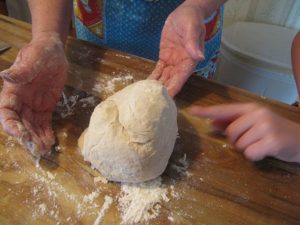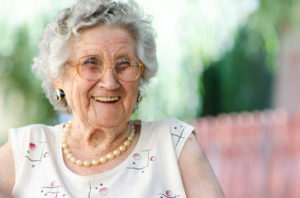Treatment Plan
After the initial visit and assessment, we will continue our work focusing on a daily task or activity that is important to you - for example:
- Independent feeding

- Getting washed or dressed, brushing teeth or combing hair
- House cleaning, doing the laundry, cooking a meal
- Participating in hobbies such as knitting, woodworking, playing cards, reading, doing puzzles or gardening
- Paying bills or balancing a checkbook
- Using a computer or phone
- Pet care
Here's an example of what a written treatment program might look like after working together and learning areas of challenge:
 Cooking a meal:
Cooking a meal:
Jean lives alone and her daughter, Laura, checks on her every day after work around 4:30.
Jean loves to cook. It is important to her and makes her feel productive and more "like herself".
Over the past few months Laura has found a pot on the stove with burnt on food, the kitchen messier than usual with several pots and utensils out on the counter and expired food in the refrigerator. She is worried about her mother's safety and feels sad that Jean is frustrated with not being able to cook "the way I used to".
After three treatment visits working together with Jean and Laura, these were the recommendations for cooking:
- Jean agrees to not use oven or stove unless Laura or someone is in the home - unplug oven if necessary
- Jean is able to use the microwave to heat prepared meals when family is not around
- During Sunday evening visits, Laura and Jean will come up with a menu for the week and get the groceries
- Every Monday, Wednesday, and Friday at 5:00 Laura and her daughter will come to Jean's home to assist with making the meal
- Schedule is placed in easy to read print next to Jean's calendar in the kitchen
- Meal prep should be broken down into simple stages
- Some parts of the meal can be prepped beforehand by Laura
- If using a recipe - Laura will break it down into simple steps
- Pictures of items in the recipe is helpful, for example a picture of two eggs instead of written instructions

- Jean communicates and listens better when there are no distractions and she is facing the person
- When cooking, the TV and music should be off
- The curtains to the window that looks out across the street to a busy supermarket parking lot should be closed - can be distracting
- Jean's small dog needs to be put in another room during meal prep - often underfoot in the kitchen
- Clean up to be done together and items put away in familiar, routine places. Extra items in kitchen that aren't used frequently should be removed

At the end of the OT treatment sessions, Jean felt happier because she was able to keep cooking AND spend more time with her daughter and granddaughter.
Laura felt like she had the skills to help Jean and keep her safe without taking away an activity that she loves.